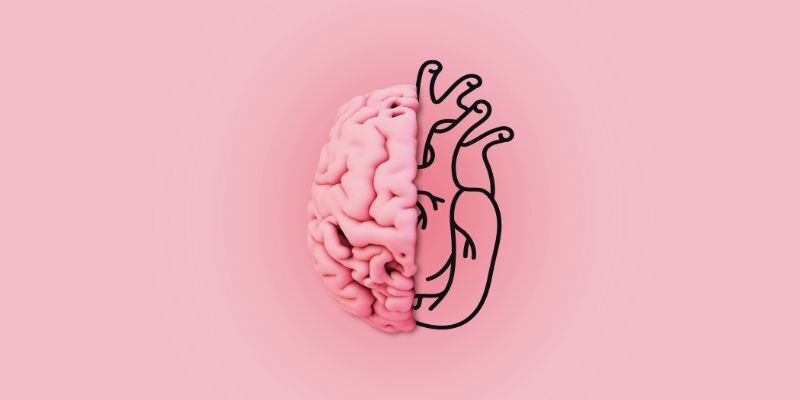Not only mental but also cardiac health depends on a healthy brain; general health also depends on it. Though the link between the brain and the heart may not be clear, several studies reveal that maintaining cardiac function depends critically on brain condition. These help maintain heart health, such as improved circulation, lower stress, and better lifestyle choices that the healthy brain fosters.
On the other hand, bad brain function can lead to bad decisions, stress, and actions that compromise the heart. Knowing this link motivates people to follow behaviors that feed the heart and brain, improving their quality of life.

The Brain-Heart Connection: What's the Link?
Though the relationship between the heart and the brain is complicated, one influences the other. The brain regulates several aspects of heart health, including blood pressure, stress levels, and lifestyle decisions. One risk factor for heart disease is inflammation and blood pressure changes brought on by chronic stress, for instance. The brain releases stress hormones such as cortisol and adrenaline, which can raise blood pressure and heart rate. This can progressively harm blood arteries and aggravate heart disease.
Conversely, a well-functioning brain can assist in controlling these systems and support a good cardiovascular system. Heart health and mental wellness entwine one other. A healthy brain helps one stay calm, lessening stress's negative impact on the heart. Emotional control and mental clarity assist in avoiding bad habits that damage the heart, such as smoking, overindulgence, or lack of exercise. Moreover, good cognitive ability might inspire people to follow heart-healthy habits, including frequent physical exercise, correct diet, and sleep, lowering their risk of heart disease.
Stress and Its Impact on Brain and Heart Health
The condition of the heart and the brain depends much on stress. Under stress, the brain triggers the "fight or flight" reaction that releases chemicals like cortisol, raising blood pressure and heart rate. Although this brief burst reaction is useful, prolonged stress can affect the heart and brain over time. Over time, raised cortisol levels can cause brain shrinkage, influencing emotional control, memory, and cognitive ability.
Concurrently, high stress fuels cardiovascular problems, including atherosclerosis, hypertension, and a higher risk of heart attacks. The brain's incapacity to control stress can also result in bad choices, such as ignoring physical exercise or turning to bad coping techniques like smoking. Stress, then, is a silent factor causing both mental and cardiac health decline. Thus, stress control is essential for the heart and the brain. Exercise, mindfulness, and meditation can help lower stress and shield organs from damage.
How Does Regular Exercise Benefit Both the Brain and Heart?
Among the best approaches to boost heart and brain function is exercise. Physical exercise boosts blood flow to the brain, which encourages the development of fresh neurons and improves cognitive ability. Regular exercise concurrently increases blood circulation, lowers blood pressure, and lowers the risk of heart disease, therefore strengthening the heart.
Additionally important for cardiovascular health are blood sugar and cholesterol levels, which physical exercise helps control. Moreover, exercise generates endorphins, molecules in the brain that improve mood and lower stress, promoting a better brain and heart. Regular exercise has been associated with better rates of mental health problems, including depression and anxiety, which are linked to poor heart health. Consequently, consistent exercise in your schedule can significantly impact the heart and mind.
Nutrition's Role in Supporting Brain and Heart Health
Maintaining both heart and brain health requires a well-balanced diet. Whole grains, fruits, vegetables, and healthy fats are nutrient-dense foods that give the brain and heart the vitamins, minerals, and antioxidants they need to operate as they should. Omega-3 fatty acids in flaxseed and seafood are particularly helpful for both organs. While reducing inflammation and lowering the risk of heart disease, these healthy fats enhance brain cell structure and function, thus improving cognitive ability.
On the other hand, poor eating habits, including too many processed foods, sweets, and unhealthy fats, can damage the heart and brain. A diet heavy in processed foods can raise oxidative stress and inflammation, which can cause cognitive decline and cardiovascular disease. Making a diet high in heart-healthy and brain-boosting nutrients a priority helps you support the health of both organs and lower your risk of chronic diseases.

Sleep and Its Importance for Both Brain and Heart Health
A pillar of both heart and brain function is sleep. The brain repairs itself, consolidates memories, and removes poisons accumulating throughout the day as we sleep. Enough sleep enhances cognitive skills, memory, mood, and brain function, enhancing mental state. Conversely, sleep deprivation has been connected to both cognitive decline and higher cardiac risk. Extended sleep deprivation can raise stress hormone levels, including cortisol, which damages the heart.
Furthermore, obesity, hypertension, and other heart disease risk factors aggravate poor sleep. Both brain and heart health depend on establishing a regular sleep schedule and guaranteeing enough sleep length. Essential for a holistic approach to health, a good night's rest boosts cognitive performance, emotional well-being, and general heart health.
Mental Health's Role in Heart Health:
Heart health directly relates to mental wellness. Those with mental illnesses, including depression, anxiety, and persistent stress, are more likely to have heart disease. All of these factors raise the risk of cardiovascular disease. These mental health problems might affect poor lifestyle choices, including lack of physical activity, improper food, or smoking.
Furthermore, mental health problems like worry can lead the body to be in a continuous state of increased attention, therefore elevating blood pressure and cardiac rate. This ongoing stress over time can wear down the heart and result in disorders including atherosclerosis and hypertension. Those who give mental wellness a top priority and seek treatment for mental health issues top priority will help their heart load to be better overall.
Conclusion:
Maintaining a healthy brain and heart requires stress management, regular exercise, a good diet, enough sleep, and mental wellness. These two essential organs are connected; a healthy brain promotes a better heart. People can lower their risk of heart disease and enhance their general quality of life by changing behaviors that support brain and heart health. Remember, looking after your brain helps not just your mind but also your heart, therefore promoting a longer, better life.







